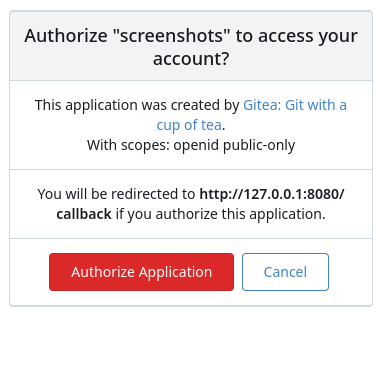Resolve#31609
This PR was initiated following my personal research to find the
lightest possible Single Sign-On solution for self-hosted setups. The
existing solutions often seemed too enterprise-oriented, involving many
moving parts and services, demanding significant resources while
promising planetary-scale capabilities. Others were adequate in
supporting basic OAuth2 flows but lacked proper user management
features, such as a change password UI.
Gitea hits the sweet spot for me, provided it supports more granular
access permissions for resources under users who accept the OAuth2
application.
This PR aims to introduce granularity in handling user resources as
nonintrusively and simply as possible. It allows third parties to inform
users about their intent to not ask for the full access and instead
request a specific, reduced scope. If the provided scopes are **only**
the typical ones for OIDC/OAuth2—`openid`, `profile`, `email`, and
`groups`—everything remains unchanged (currently full access to user's
resources). Additionally, this PR supports processing scopes already
introduced with [personal
tokens](https://docs.gitea.com/development/oauth2-provider#scopes) (e.g.
`read:user`, `write:issue`, `read:group`, `write:repository`...)
Personal tokens define scopes around specific resources: user info,
repositories, issues, packages, organizations, notifications,
miscellaneous, admin, and activitypub, with access delineated by read
and/or write permissions.
The initial case I wanted to address was to have Gitea act as an OAuth2
Identity Provider. To achieve that, with this PR, I would only add
`openid public-only` to provide access token to the third party to
authenticate the Gitea's user but no further access to the API and users
resources.
Another example: if a third party wanted to interact solely with Issues,
it would need to add `read:user` (for authorization) and
`read:issue`/`write:issue` to manage Issues.
My approach is based on my understanding of how scopes can be utilized,
supported by examples like [Sample Use Cases: Scopes and
Claims](https://auth0.com/docs/get-started/apis/scopes/sample-use-cases-scopes-and-claims)
on auth0.com.
I renamed `CheckOAuthAccessToken` to `GetOAuthAccessTokenScopeAndUserID`
so now it returns AccessTokenScope and user's ID. In the case of
additional scopes in `userIDFromToken` the default `all` would be
reduced to whatever was asked via those scopes. The main difference is
the opportunity to reduce the permissions from `all`, as is currently
the case, to what is provided by the additional scopes described above.
Screenshots:




---------
Co-authored-by: wxiaoguang <wxiaoguang@gmail.com>
See discussion on #31561 for some background.
The introspect endpoint was using the OIDC token itself for
authentication. This fixes it to use basic authentication with the
client ID and secret instead:
* Applications with a valid client ID and secret should be able to
successfully introspect an invalid token, receiving a 200 response
with JSON data that indicates the token is invalid
* Requests with an invalid client ID and secret should not be able
to introspect, even if the token itself is valid
Unlike #31561 (which just future-proofed the current behavior against
future changes to `DISABLE_QUERY_AUTH_TOKEN`), this is a potential
compatibility break (some introspection requests without valid client
IDs that would previously succeed will now fail). Affected deployments
must begin sending a valid HTTP basic authentication header with their
introspection requests, with the username set to a valid client ID and
the password set to the corresponding client secret.
The PKCE flow according to [RFC
7636](https://datatracker.ietf.org/doc/html/rfc7636) allows for secure
authorization without the requirement to provide a client secret for the
OAuth app.
It is implemented in Gitea since #5378 (v1.8.0), however without being
able to omit client secret.
Since #21316 Gitea supports setting client type at OAuth app
registration.
As public clients are already forced to use PKCE since #21316, in this
PR the client secret check is being skipped if a public client is
detected. As Gitea seems to implement PKCE authorization correctly
according to the spec, this would allow for PKCE flow without providing
a client secret.
Also add some docs for it, please check language as I'm not a native
English speaker.
Closes#17107Closes#25047
Change all license headers to comply with REUSE specification.
Fix#16132
Co-authored-by: flynnnnnnnnnn <flynnnnnnnnnn@github>
Co-authored-by: John Olheiser <john.olheiser@gmail.com>
The OAuth spec [defines two types of
client](https://datatracker.ietf.org/doc/html/rfc6749#section-2.1),
confidential and public. Previously Gitea assumed all clients to be
confidential.
> OAuth defines two client types, based on their ability to authenticate
securely with the authorization server (i.e., ability to
> maintain the confidentiality of their client credentials):
>
> confidential
> Clients capable of maintaining the confidentiality of their
credentials (e.g., client implemented on a secure server with
> restricted access to the client credentials), or capable of secure
client authentication using other means.
>
> **public
> Clients incapable of maintaining the confidentiality of their
credentials (e.g., clients executing on the device used by the resource
owner, such as an installed native application or a web browser-based
application), and incapable of secure client authentication via any
other means.**
>
> The client type designation is based on the authorization server's
definition of secure authentication and its acceptable exposure levels
of client credentials. The authorization server SHOULD NOT make
assumptions about the client type.
https://datatracker.ietf.org/doc/html/rfc8252#section-8.4
> Authorization servers MUST record the client type in the client
registration details in order to identify and process requests
accordingly.
Require PKCE for public clients:
https://datatracker.ietf.org/doc/html/rfc8252#section-8.1
> Authorization servers SHOULD reject authorization requests from native
apps that don't use PKCE by returning an error message
Fixes#21299
Co-authored-by: wxiaoguang <wxiaoguang@gmail.com>
Co-authored-by: Lunny Xiao <xiaolunwen@gmail.com>
According to the OAuth spec
https://datatracker.ietf.org/doc/html/rfc6749#section-6 when "Refreshing
an Access Token"
> The authorization server MUST ... require client authentication for
confidential clients
Fixes#21418
Co-authored-by: Gusted <williamzijl7@hotmail.com>
Co-authored-by: Lunny Xiao <xiaolunwen@gmail.com>